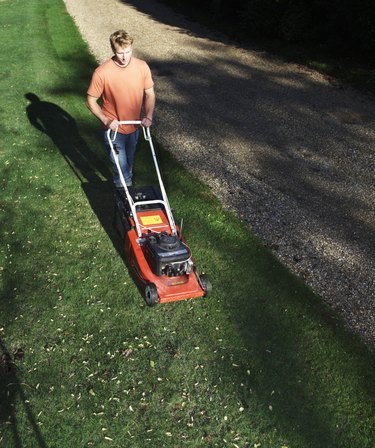 Sand only increases drainage problems in poor, compacted soil. Image Credit: Nick Daly/Photodisc/Getty Images
Sand only increases drainage problems in poor, compacted soil. Image Credit: Nick Daly/Photodisc/Getty Images
Muddy lawns are all too common when homeowners plant grass in areas that don't have suitable drainage. Although sand isn't a good amendment option, other methods can be used to mend a mud problem. Unfortunately, some of those methods may involve sacrificing the lawn for one year while the soil is fixed.
Video of the Day
Causing the Muddy Mess
Mud occurs for a variety of reasons, but it boils down to a problem with drainage. When water has nowhere to go, it mixes with the top few inches of soil and results in a whole lot of mud. That situation happens especially when soil drains poorly because of its components or the yard has points of standing water that have no place to drain. Often mud results when a barrier layer such rock or even sand is about only 1 foot below the soil surface; that soil simply is not deep enough to allow water to drain.
Adding Sand Not the Solution
Some people advocate installing athletic fields on sand bases because sand becomes far less muddy and difficult than soil during rainy seasons and still compacts relatively well during dry seasons. The sand, however, is used for large, commercial areas, not home lawns, and the process involves carefully cultivating turf on top of sand, not adding sand to an already muddy lawn. Unfortunately, the combination of mud and sand results in a consistency akin to concrete. Although the mixture may stop part of a mud problem, it prohibits drainage even more than when sand wasn't present, resulting in standing water and harming grass health.
Diverting Water
Another problem with mud is that it doesn't bind well to the ground beneath it. Therefore, soil may be carried away by rain. Address a muddy patch by figuring out how to divert its overabundance of water. Especially at the bottom end of a sloped yard or in the middle of a flat yard, water can collect and form pools that turn into slippery mud after only a little rain. Instead of allowing the water to collect, provide drainage channels so the water can run off a hill, or aerate your lawn so water flows into the resulting small holes in the lawn instead of standing on top of the lawn.
Lightening the Load
The best way to reduce mud is to amend soil with a substance such as compost or manure that truly increases drainage and allows water to filter into the ground. Unfortunately, amending soil is difficult in an existing lawn. The process may require scrapping the current year's grass, tilling the soil, incorporating a several-inch-thick layer of compost with the soil and regrowing the grass after the rainy season. Adding topsoil also can help if the lawn has a subsurface barrier layer.



























